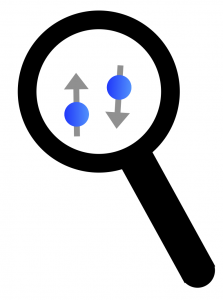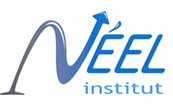- Home
- Institut Néel
- Research teams
- Technical Groups & Services
- Work at the Institut
- Partnerships
 Next Quantum Materials/LANEF seminar:
Next Quantum Materials/LANEF seminar:
Thursday, June 20th 2024 at 2:00 pm
Cheryl Feuillet-Palma (ESPCI)
“ Hybrid quantum systems with high-temperature superconducting resonators “
To access this seminar:
Institut Néel CNRS, Building K, Room Rémy Lemaire (K223)
Abstract: Resonators are essential components of microwave circuits, fulfilling a wide variety of functions, from narrow-band filtering to enhancing the interaction between quantum systems and electromagnetic waves. Resonator performance is limited by material losses. The use of superconductors considerably reduces dissipation, thereby increasing quality factors. Most superconducting resonators are manufactured using low-Tc superconductors (Al, Nb, NbN) using well-established manufacturing processes, and feature very high quality factors [1,2]. The use of high-temperature superconductors opens up unprecedented field and temperature operating ranges, while preserving high quality factors.
We present a detailed study of coplanar waveguide resonators fabricated from the high- temperature superconducting cuprate YBa2Cu3O7-δ in different coupling regimes. We show that increasing the capacitive coupling to the external circuit leads to a continuous transition from an undercoupled dissipative regime to a lossless overcoupled regime, characterized by a decrease in the resonator quality factor. Our experimental results (resonant frequency, coupling, quality factor and insertion loss) are in good agreement with the predictions of circuit model theory and the results reported for low-Tc resonators [2]. To assess the potential of YBa2Cu3O7-δ resonators, we used our highest quality factor resonator to perform electron spin resonance on two spin systems: a di(phenyl)-(2,4,6-trinitrophenyl)iminoazanium (DPPH) molecular spin ensemble [3,4] and on the electron spins of Cr3+ ions contained in a ruby crystal.
Our results show that YBa2Cu3O7-δ resonators offer a promising technology, not only for performing ESR experiments, but also for creating hybrid quantum systems in which quantum information could be stored or processed.
[1] J. Zmuidzinas et al, Annu. Rev. Condens. Matter Phys. 2012, 3, 169-214.
[2] M. Göppl et al, J. Appl. Phys. 2008, 104, 113904.
[3] A. Ghirri et al, Appl. Phys. Lett. 2015 106, 184101.
[4] Velluire-Pellat et al, Sci Rep 13, 14366 (2023)
The organizers:
Elsa Lhotel (elsa.lhotel@neel.cnrs.fr)
Florence Levy-Bertrand (florence.levy-bertrand@neel.cnrs.fr)
